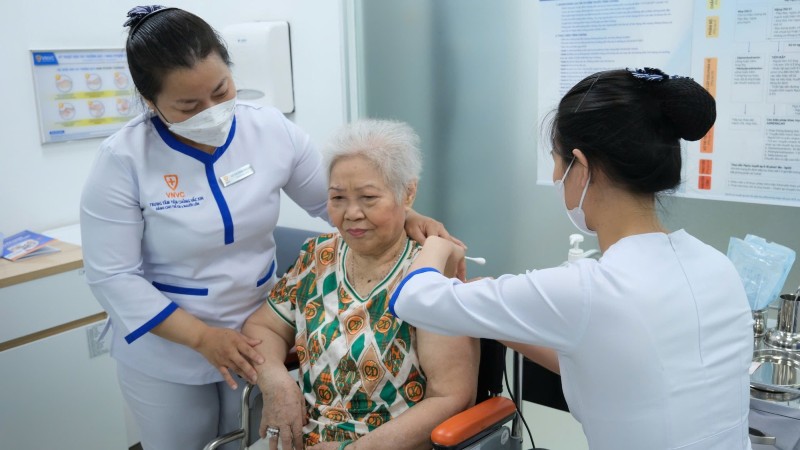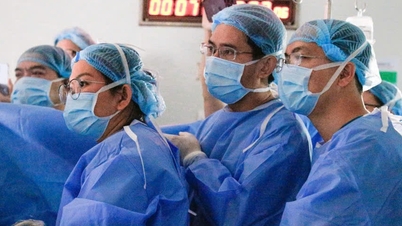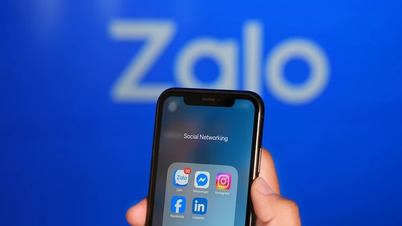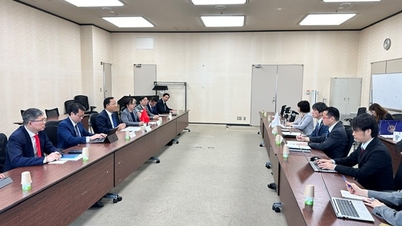This is a warning from medical experts about a common but easily overlooked disease that leads to long-term health decline.
 |
| Vaccination is necessary to prevent shingles. |
Dr. Vu Minh Dien, Deputy Head of the Department of Internal Medicine, said that many patients hospitalized with shingles often experience severe skin lesions and persistent nerve pain. This is a disease caused by the herpes zoster virus, commonly occurring in the elderly, especially those with underlying diseases or immunodeficiency.
Specifically, a typical case is Mr. NCX (77 years old, Hanoi ). Five days before being hospitalized, he had itching and blisters in clusters in the abdomen, ribs and left waist, accompanied by severe pain.
Despite self-medication at home, his condition did not improve. Upon admission to the hospital, he was diagnosed with shingles and post-herpetic neuralgia, on top of chronic gout.
Similarly, Mrs. HTP (73 years old, Hanoi) also had blisters on her left flank and abdomen, accompanied by a burning, stinging pain that lasted for a long time. At first, her family thought she had "shingles" and applied folk remedies such as applying green beans.
However, her condition became worse, the blisters spread, causing severe pain, fatigue, insomnia and persistent headaches. When admitted to the hospital, she was diagnosed with shingles with severe skin lesions.
At the hospital, the patients were treated with the antiviral drug Acyclovir, painkillers, intensive skin care and intravenous antibiotics to prevent the risk of bacterial superinfection. After more than a week of treatment, the patients' conditions improved significantly. The blisters dried up, the pain gradually decreased and their health gradually recovered.
Dr. Vu Minh Dien said that shingles is clearly manifested by red rash and small fluid-filled blisters that grow in clusters, often appearing in strips in the lumbar region or flanks, causing severe pain along the path of the nerve.
The pain can last for months or even years after the blisters have healed, known as post-herpetic neuralgia. This condition not only causes persistent discomfort but also makes the patient weak, reduces resistance and seriously affects the quality of life.
Shingles is a disease caused by the herpes zoster virus, which hides in the sensory nerves and reactivates when the immune system is weakened. The disease can occur at any age, but is most common in people over 50 years old and people with underlying diseases such as diabetes, liver disease, kidney disease, or immunodeficiency.
Although shingles is not a contagious disease and has a low risk of spreading, if not detected early and treated properly, the disease can cause many serious complications.
Complications include conjunctivitis, keratitis, glaucoma, and even blindness due to inflammation of the retina or optic nerve.
Other less common complications include facial nerve palsy, stroke, VZV encephalitis, myelitis, and cerebral arteritis.
In particular, for people with underlying diseases, shingles can also aggravate existing diseases such as increased risk of cardiovascular complications, increased blood sugar, worsening kidney disease, liver disease, and many other problems.
Dr. Nguyen Nguyen Huyen, Director of the Center for Disease Control and Prevention, Central Hospital for Tropical Diseases, recommends that people over 50 years old, especially those with underlying medical conditions or immunodeficiency, should proactively get vaccinated against shingles.
Vaccines not only reduce the risk of disease but also reduce the severity of the disease if the patient is infected. This is an effective measure to help the elderly protect their long-term health and improve their quality of life.
In addition, Dr. Nguyen Huyen also emphasized that when there are early signs such as burning pain, red rash or blisters on the skin, patients need to see a doctor early for timely diagnosis and treatment. Early treatment will help reduce the risk of serious complications, improve health and avoid long-term effects on the patient's quality of life.
According to Dr. Bach Thi Chinh, Medical Director of VNVC Vaccination System, the shingles vaccine (also known as herpes zoster), produced by pharmaceutical company GSK, has been used globally since 2017.
To date, the vaccine has been approved and used in more than 50 countries, many of which have placed large orders for inclusion in their national vaccination programs, such as the UK, Australia, Greece, Canada, Germany, Italy and New Zealand.
The herpes zoster vaccine is produced using inactivated, recombinant technology, with a formula containing special pharmaceutical ingredients, helping to increase effectiveness in the elderly, people with underlying diseases and people with immunodeficiency due to disease.
The vaccine is up to 97% effective in preventing shingles in people aged 50 and older, and 87% effective in people aged 18 and older who are immunocompromised due to illness. At the same time, the vaccine also helps reduce post-herpetic neuralgia and other complications, with an effectiveness of up to 90%. Notably, the vaccine's effectiveness can last for more than 10 years.
The herpes zoster vaccine is indicated for adults 50 years of age and older and for those 18 years of age and older who are at high risk of developing herpes zoster, such as those who are immunocompromised or immunosuppressed due to disease or medication. People 50 years of age and older receive two doses, two months apart, while people 18 years of age and older who are at high risk of developing herpes zoster receive two doses, one month apart.
Shingles is a disease caused by the Varicella Zoster virus (VZV), which is the cause of chickenpox. After contracting chickenpox, the virus is not completely destroyed but hides in the nerve roots. When encountering favorable factors such as old age, immunodeficiency, stress, or underlying diseases, the virus can reactivate and cause shingles.
The disease can manifest as red rashes, vesicles and bullae clustered along the distribution of peripheral nerves. Herpes zoster usually appears on one side of the body and can heal on its own after 2-4 weeks. However, this disease can cause many dangerous complications, such as encephalitis, meningitis, facial paralysis, tinnitus, or conjunctivitis and keratitis, leading to blindness.
In particular, one of the most worrying complications is postherpetic neuralgia (PHN), which can last for months or even a lifetime, causing severe pain to the patient. The incidence of PHN is 15-25 times higher in people over 50 years old than in people under 30 years old.
Dr. Truong Huu Khanh, Vice President of the Ho Chi Minh City Infectious Diseases Association, emphasized that the shingles vaccine helps prevent the reactivation of the virus in nerve ganglia, thereby minimizing the risk of disease and serious complications.
This is a proactive and effective preventive solution for people aged 50 and over, or 18 and over at high risk of developing shingles.
Source: https://baodautu.vn/zona-than-kinh-benh-de-bo-qua-nhung-hau-qua-nang-ne-d279364.html





![[Photo] Prime Minister Pham Minh Chinh receives leaders of Excelerate Energy Group](https://vphoto.vietnam.vn/thumb/1200x675/vietnam/resource/IMAGE/2025/5/29/c1fbe073230443d0a5aae0bc264d07fe)

![[Photo] Prime Minister Pham Minh Chinh attends the event "Digital transformation of the banking industry by 2025"](https://vphoto.vietnam.vn/thumb/1200x675/vietnam/resource/IMAGE/2025/5/29/0e34cc7261d74e26b7f87cadff763eae)























































































Comment (0)